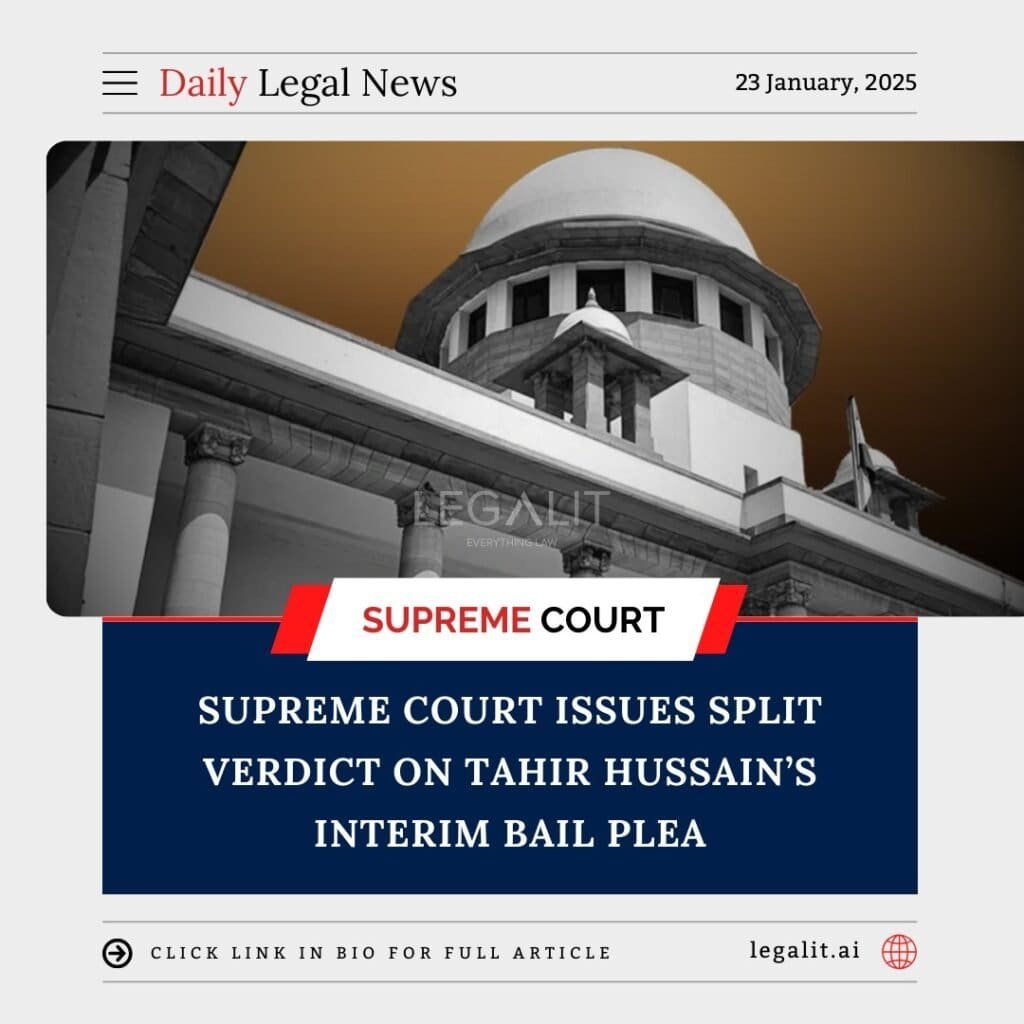Background

The Supreme Court delivered a split verdict on the interim bail application of Tahir Hussain, a former Aam Aadmi Party (AAP) councillor, accused in cases linked to the 2020 Delhi riots. Hussain, currently in judicial custody, had sought interim relief on grounds of personal and medical exigencies. The matter has now been referred to a larger bench for resolution.
Hussain faces multiple cases, including charges under the Unlawful Activities (Prevention) Act (UAPA), alleging his involvement in inciting violence during the riots.
Court’s Observations and Verdict
- Divergent Views:
- One judge on the bench supported granting interim bail, citing personal liberty and the principle that bail, not jail, should be the norm unless the case against the accused is prima facie strong.
- The other judge dissented, expressing concerns about the gravity of the charges and potential influence on witnesses or tampering with evidence if bail were granted.
- Referral to Larger Bench:
- Given the split, the matter has been referred to a larger bench for a final decision.
- The court emphasized the need to balance the seriousness of the allegations with the fundamental rights of the accused.
Arguments by the Petitioner
- Violation of Liberty: Hussain’s counsel argued that prolonged incarceration without trial violates his constitutional right to personal liberty under Article 21.
- Medical and Family Grounds: The plea highlighted pressing family and medical circumstances requiring his temporary release.
- Delayed Trial: The defense pointed to delays in the judicial process, stressing that Hussain’s continued custody was unwarranted in the absence of a speedy trial.
Prosecution’s Counterarguments
- Severity of Allegations: The prosecution opposed the bail plea, emphasizing the grave nature of the charges, including alleged conspiracy and involvement in orchestrating the riots.
- Potential Threat to Justice: Concerns were raised about Hussain’s influence over witnesses and the risk of tampering with evidence if granted bail.
- Legal Precedents: The prosecution cited past judgments underscoring the need for caution in granting bail in cases involving national security and public order.
Broader Implications
- Judicial Scrutiny of Bail Applications:
- The split verdict reflects the nuanced judicial approach required in balancing individual rights against public safety concerns.
- It raises important questions about the criteria for granting bail in high-profile cases involving severe charges.
- Impact on Trial Progress:
- The delay in deciding the interim bail application could affect the pace of Hussain’s trial and related investigations.
- It underscores the need for procedural efficiency in addressing bail pleas in sensitive cases.
- Public and Political Reactions:
- The case has significant political undertones, with Hussain being a former political figure accused of involvement in communal violence.
- The split verdict may fuel debates on judicial impartiality and the handling of politically sensitive cases.
Conclusion
The Supreme Court’s split verdict on Tahir Hussain’s interim bail plea highlights the challenges of adjudicating cases that intertwine legal, political, and social dimensions. As the matter moves to a larger bench, the decision will likely set a precedent for how courts navigate the complexities of granting bail in cases involving serious allegations and public interest considerations. This case also reiterates the importance of balancing individual liberty with the imperatives of justice and societal order.